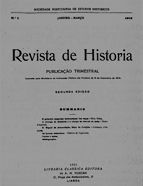

................................
The " circular-programme " presented in 1911 articulated several fundamental ideas underpinning the initiative, particularly one that distinguished it from the dominant historiographical ideas of the time: “ The fundamental nature of historical truth lies in its approximative character, an aspiration, therefore, an ideal that is continually sought, and in its relativity to time, a temporal truth that cannot be measured by repetition ” ( op. cit. , p. 219). In this way, the promoters distanced themselves from what they deemed the anti-historical conceptions of positivists. They instead disseminated a theoretical framework, still anchored in the concept of evolution, characterised by methodological principles such as the relativity of knowledge, temporally situated analysis, critique as an epistemological tool (particularly as a method), contingency, the impossibility of predicting the future, the connection of history with life in a utilitarian framework (understanding the past to act in the present), and the view of history as the "science of life" , in other words, a common denominator across all knowledge. Other principles included the causal association with evolution, the uniqueness and irreproducibility of historical facts, and the combined use of analysis and synthesis. Collectively, these ideas constituted an epistemological and historiographical perspective that was contemporaneous with European standards and would later be disseminated in Portugal.
It is also based on this historical-methodological paradigm that the SPEH sought to renew Portuguese historical studies. Its promoters outlined an activity plan that included regular sessions of the SPEH, the publication of an official journal ( Revista de História ), the organisation of conferences and public lectures, the dissemination of sources, collaboration with similar institutions and schools, the organisation of congresses, and maintaining a close relationship with central authorities.
This work is financed by national funds through FCT - Foundation for Science and Technology, I.P, in the scope of the projects UIDB/04311/2020 and UIDP/04311/2020.
